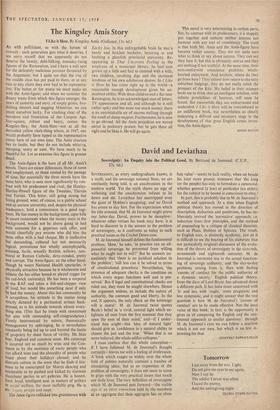The Kingsley Amis Story
et s with politicians, so with the heroes of :omedy : each generation gets what it deserves. I im sorry myself that we apparently do not leserve the bawdy, debt-bilking, noonday-rising figures of the Restoration, and I have a soft spot or the delicately malicious persatue favoured by he Augustans; but I quite see that the rise of he middle class has put paid to them, or at any rate to any claim they ever had to be representa- tive. For better or for worse we must make do with the Amis-figure; and when we consider the dreary waste from which this figure emerges, the Years of austerity and envy, of empty grates, five- shilling dinners and nagging Ministries, we can count ourselves lucky. For crashing clear of the boredom and frustration of the Coupon Age, our-square, robust and beery, comes the Cingsley-Boy, the Amis-Man—not at all the shrivelled yellow clerk-thing whom, in 1947, one would probably have tipped as the representative comic hero of our own time. The Amis creation has its faults, but they do not include whining, pooping, usury or cant. We have much to be hankful for. Let us examine this figure in greater letail.
The Amis-figure is the hero of all Mr. Amis's novels. There are minor differences, those of name and employment, or those caused by the passage if time, but essentially the three novels have the same hero, who is seen most significantly by con- trast with his predecessor and rival, the Huxley- Rartley-Powell figure of the Twenties, Thirties and Forties. This latter, still going strong but losing ground, went, of course, to a public school and art ancient university, and, despite his physical inadequacy, held a commission in a good regi- nent. He has money in the background, signs bills in smart 'restaurants when the money stays in the background, would not be above going to bed with someone for a generous cash offer, and would cheerfully pay anyone who did him the same office with a bad cheque. He is ineffective but demanding, cultured but not necessarily logical, pretentious but wholly unemployable, amusing, facile; sexually flexible, willowy, non- Moral or Roman Catholic, dirty-minded, pretty and corrupt. The Amis-figure, on the other hand, though he wears National Health spectacles, is Physically attractive because he is wholesome and athletic (he has either boxed or played rugger for his red-brick university). He has been a corporal in the RAF and takes a fish-and-chipper view of food, but would like something nicer if only he had the money. About this last commodity he is scrupulous, his attitude in the matter being strictly dictated by a puritanical, artisan back- ground, as is his attitude towards almost every- thing else. (This fact he treats with resentment but also with resounding self-congratulation.) Firmly heterosexual by nature, theoretically Monogamous by upbringing, he is nevertheless constantly being led up to and beyond the limits of propriety by sheer force of virility. He likes beer, England and common sense. His contempt is incurred not so much by wine and the Con- tinent as by the nastiness of many people who Can afford wine and the absurdity of people who boast about their holidays abroad; and he distrusts culture in the sense that he finds it tire- spine to be conscripted for Morris dancing and intolerable to be pushed and kicked by German charabanc parties in art galleries. He is honest, kind, loyal, intelligent and, in matters of politics or social welfare, the most ineffable prig. He is ak boozy. priapic and inept.
The Amis-figure rollicked into prominence with
Lucky Jim. In this unforgettable book he was a randy and feckless bachelor, lecturing at and loathing a ghoulish provincial university. Re- appearing in That Uncertain Feeling as the employee of a municipal library, he had now grown up a little and had to contend with a wife, two children, revolting digs and the incessant lewdness of his own adulterous desires. In I Like it Here he has come right up in the world—a reasonable enough development given his un- doubted ability. With three children and a flat near Kensington, he is an acknowledged man of letters, TV appearances and all, and although he is still rather spiky and has none too much money, there is an unmistakable air of success wafting through the smell of damp nappies. Furthermore, he is now to go abroad. All the Amis prejudices are waved about in prefatory protest, but he gets there all right and he likes it. He will go again. This novel is very entertaining in certain parts, but, by contrast with its predecessors, it is sloppily put together and sustains neither interest nor humour with any sort of consistency. The truth is that both Mr. Amis and the Amis-figure have become rather uneasy. They are not quite sure what to think or say about success. They can say they hate it, but this is obviously untrue and they are nothing if not truthful, At the same time, their non-conformist conscience prohibits whole- hearted enjoyment. And anyhow, where do they go from here? They cannot now return to the tatty suburban lodgings, they do not really relish the prospect of the Ritz. My belief in their acumen leads me to think that an intelligent solution, with infinite possibilities of humour, will soon be found. But meanwhile they are embarrassed and undecided. I Like it Here will be remembered as an indifferent book, but nevertheless as clearly . indicating a difficult and necessary stage in the development of that great English comic inven- tion, the Amis-figure.
SIMON RAVEN






























 Previous page
Previous page